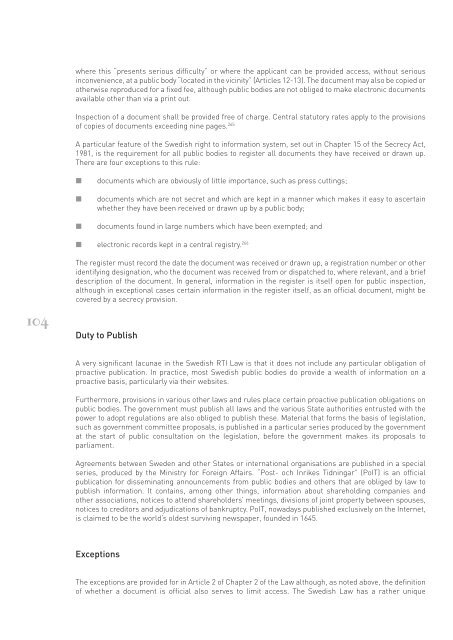Freedom of Information: A Comparative Legal Survey - Federation of ...
Freedom of Information: A Comparative Legal Survey - Federation of ...
Freedom of Information: A Comparative Legal Survey - Federation of ...
You also want an ePaper? Increase the reach of your titles
YUMPU automatically turns print PDFs into web optimized ePapers that Google loves.
104<br />
where this “presents serious diffi culty” or where the applicant can be provided access, without serious<br />
inconvenience, at a public body “located in the vicinity” (Articles 12-13). The document may also be copied or<br />
otherwise reproduced for a fi xed fee, although public bodies are not obliged to make electronic documents<br />
available other than via a print out.<br />
Inspection <strong>of</strong> a document shall be provided free <strong>of</strong> charge. Central statutory rates apply to the provisions<br />
<strong>of</strong> copies <strong>of</strong> documents exceeding nine pages. 265<br />
A particular feature <strong>of</strong> the Swedish right to information system, set out in Chapter 15 <strong>of</strong> the Secrecy Act,<br />
1981, is the requirement for all public bodies to register all documents they have received or drawn up.<br />
There are four exceptions to this rule:<br />
documents which are obviously <strong>of</strong> little importance, such as press cuttings;<br />
documents which are not secret and which are kept in a manner which makes it easy to ascertain<br />
whether they have been received or drawn up by a public body;<br />
documents found in large numbers which have been exempted; and<br />
electronic records kept in a central registry. 266<br />
The register must record the date the document was received or drawn up, a registration number or other<br />
identifying designation, who the document was received from or dispatched to, where relevant, and a brief<br />
description <strong>of</strong> the document. In general, information in the register is itself open for public inspection,<br />
although in exceptional cases certain information in the register itself, as an <strong>of</strong>fi cial document, might be<br />
covered by a secrecy provision.<br />
Duty to Publish<br />
A very signifi cant lacunae in the Swedish RTI Law is that it does not include any particular obligation <strong>of</strong><br />
proactive publication. In practice, most Swedish public bodies do provide a wealth <strong>of</strong> information on a<br />
proactive basis, particularly via their websites.<br />
Furthermore, provisions in various other laws and rules place certain proactive publication obligations on<br />
public bodies. The government must publish all laws and the various State authorities entrusted with the<br />
power to adopt regulations are also obliged to publish these. Material that forms the basis <strong>of</strong> legislation,<br />
such as government committee proposals, is published in a particular series produced by the government<br />
at the start <strong>of</strong> public consultation on the legislation, before the government makes its proposals to<br />
parliament.<br />
Agreements between Sweden and other States or international organisations are published in a special<br />
series, produced by the Ministry for Foreign Affairs. “Post- och Inrikes Tidningar” (PoIT) is an <strong>of</strong>fi cial<br />
publication for disseminating announcements from public bodies and others that are obliged by law to<br />
publish information. It contains, among other things, information about shareholding companies and<br />
other associations, notices to attend shareholders’ meetings, divisions <strong>of</strong> joint property between spouses,<br />
notices to creditors and adjudications <strong>of</strong> bankruptcy. PoIT, nowadays published exclusively on the Internet,<br />
is claimed to be the world’s oldest surviving newspaper, founded in 1645.<br />
Exceptions<br />
The exceptions are provided for in Article 2 <strong>of</strong> Chapter 2 <strong>of</strong> the Law although, as noted above, the defi nition<br />
<strong>of</strong> whether a document is <strong>of</strong>fi cial also serves to limit access. The Swedish Law has a rather unique
















